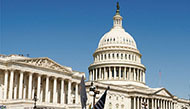
President-elect Barack Obama has drawn worldwide attention. A drawing of him hung on a shop wall in Ramallah.
ETHAN BRONNER ESSAYGAZA - From far away, this is how it looks: There is a country out there where tens of millions of white Christians, voting freely, select as their leader a black man of modest origin, the son of a Muslim. There is a place on Earth - call it America - where such a thing happens.
Even where the United States is held in special contempt, like here in this benighted Palestinian coastal strip, the “glorious epic of Barack Obama, as the leftist French editor Jean Daniel calls it, makes America - the idea as much as the actual place - stand again, perhaps only fleetingly, for limitless possibility.
“It allows us all to dream a little,’’ said Oswaldo Calvo, 58, a Venezuelan political activist in Caracas, in a comment echoed to correspondents of The New York Times on four continents in the days leading up to the election.
Tristram Hunt, a British historian, put it this way: Mr. Obama “brings the narrative that everyone wants to return to - that America is the land of extraordinary opportunity and possibility, where miracles happen.
But wonder is almost overwhelmed by relief. Mr. Obama’s election offers most non-Americans a sense that the imperial power capable of doing such good and such harm - a country that, they complain, preached justice but tortured its captives, launched a disastrous war in Iraq, turned its back on the environment and greedily dragged the world into economic chaos - saw the errors of its ways over the past eight years and shifted course.
They say the country that weakened democratic forces abroad through a tireless but often ineffective campaign for democracy - dismissing results it found unsavory, cutting deals with dictators it needed as allies in its other battles - was now shining a transformative beacon with its own democratic exercise.
It would be hard to overstate how fervently vast stretches of the globe wanted the election to turn out as it did to repudiate the Bush administration and its policies. Poll after poll in country after country showed only a few - Israel, Georgia, the Philippines - favoring a victory for Senator John McCain.
“Since Bush came to power it’s all bam, bam, bam on the Arabs, asserted Fathi Abdel Hamid, 40, as he sat in a Cairo coffee house.
The world’s view of an Obama presidency presents a paradox. His election embodies what many consider unique about the United States -yet America’s sense of its own specialness, of its destiny and mission, has driven it astray, they say. They want Mr. Obama, the beneficiary and exemplar of American exceptionalism, to act like everyone else, only better, to shift American policy and somehow to project both humility and leadership.
And there are others who fear that Mr. Obama will be soft in a hard-edged world where what is required is to make clear limits for fanatics, aggressors and bullies. Israelis worry that he will talk to Iran rather than stop it from developing nuclear weapons; Georgians worry that he will not grasp how to handle Russia.
An Obama presidency, they say, risks appeasement. It will “reassure Europeans of their defects, lamented Giuliano Ferrara, editor of the Italian right-wing daily Il Foglio.
Such contradictory demands and expectations may reflect, in part, the unusual makeup of a man of mixed race and origin whose life and upbringing have touched several continents.
“People feel he is a part of them because he has this multiracial, multiethnic and multinational dimension,’’ said Philippe Sands, a British international lawyer .
Francis Nyamnjoh, a Cameroonian novelist and social scientist, said he saw Mr. Obama less as a black man than “as a successful negotiator of identity margins.
His ability to inhabit so many categories mirrors the African experience. Mr. Nyamnjoh said that for America to choose as its citizen in chief such a skillful straddler of global identities could not help but transform the nation’s image, making it once again the screen upon which the hopes and ambitions of the world are projected.
Shi Yinhong, a professor of international relations at the People’s University of China, said Mr. Obama’s background, particularly his upbringing in Indonesia, made him suited to understanding the problems facing the world’s poorer nations.
He and others say they hope the next American president will see their place more firmly within the community of nations, engaging in what Jairam Ramesh, junior commerce minister in the Indian government, called “genuine multilateralism and not in muscular unilateralism.
Assuming Mr. Obama does play by international rules more fully, as he has promised, can his government live up to all the expectations?
“We have so many hopes and wishes that he will never be able to fulfill them, said Susanne Grieshaber, 40, an art adviser in Berlin who was one of 200,000 Germans to attend a speech by Mr. Obama there in July. She cited action to protect the environment, reducing the use of force and helping the less fortunate. In essence, she wants Mr. Obama to make his country more like hers.
But she is sober. “I’m preparing myself for the fact that peace and happiness are not going to suddenly break out, she said.
스마터리빙
more [ 건강]
[ 건강]이제 혈관 건강도 챙기자!
[현대해운]우리 눈에 보이지 않기 때문에 혈관 건강을 챙기는 것은 결코 쉽지 않은데요. 여러분은 혈관 건강을 유지하기 위해 어떤 노력을 하시나요?
 [ 건강]
[ 건강]내 몸이 건강해지는 과일궁합
 [ 라이프]
[ 라이프]벌레야 물럿거라! 천연 해충제 만들기
 [ 건강]
[ 건강]혈압 낮추는데 좋은 식품
[현대해운]혈관 건강은 주로 노화가 진행되면서 지켜야 할 문제라고 인식되어 왔습니다. 최근 생활 패턴과 식생활의 변화로 혈관의 노화 진행이 빨라지고
사람·사람들
more많이 본 기사
- 트럼프, 자신 비판해온 배우 클루니 佛국적 취득에 “굿뉴스”
- 멕시코, 미국서 수배한 마약 카르텔 우두머리급 체포
- [미주 한국일보 2026년 연중 기획 사업] 매년 풍성하고 유익한 행사… 올해도 한인사회와 함께
- 팔순앞둔 트럼프, 건강논란 거듭 일축 “검사받아 괜히 의혹키워”
- 트럼프 “워싱턴 개선문 건설, 두달내 시작…아주 훌륭할 것”
- 신화 이민우, 두 딸과 함께.. “나를 찾아와준 보물들”
- 젤렌스키 “평화협정까지 10% 남아…약한 협정엔 서명 안해”
- 빅뱅 출신 탑, 2026년 가수로 전격 컴백
- 머스크의 뉴럴링크, 새해부터 뇌-컴퓨터 연결장치 대량생산
- 식당 가면 4% 음식세 더 내야
- ‘메시보다는 손흥민과...’ 美 전역 SON에 푹 빠졌다! 무려 500명 대상 ‘가장 뛰고 싶은 팀’ LAFC 선정
- “오픈AI, 말로 구동하는 AI기기 준비중…음성AI 고도화 매진”
- LA 올림픽, 도시 전체가 경기장… 한인타운 인근서도 경기
- 한인복지센터 ‘자원봉사자 감사의 날’
- ‘2025 WS 우승’ 김혜성 새해 인사 “언제나 최선을 다하는 선수될 것→응원 너무 감사드린다”
- 스페이스X·오픈AI·앤스로픽, 역대 최대급 IPO 예고
- 건강보험 보조금 종료…중간선거 낀 새해 최대 정치쟁점으로
- 2025년 작별 고한 한인사회 원로들
- 한인 음악인들 ´희망의 선율´ 병오년 새해 밝힌다
- VA, 새해부터 스팸 전화·문자 강력 규제
- 베네수엘라, 美압박에 맞서 미국인 구금…최소 5명 체포
- [2026 북중미 월드컵 상금은] 6억5천만달러 ‘돈 잔치’… 우승하면 5천만달러
- 유승민, ‘李정부 총리 제의설’ 확인… 1
- 남궁옥분 “故 송도순, 열흘 전부터 혼수상태..큰 별 졌다”
- 이혜훈 ‘보좌진 갑질’ 녹취 폭로…국… 2
- 워싱턴VA대, 88만 달러 그랜트 받아
- “오직 십자가의 주님을 따르겠다”
- 새로운 여명… 이제 다시 희망이다
- 페어팩스 상습 차량 절도범 검거…32개 혐의로 기소
- 첫 무슬림 뉴욕시장 맘다니 취임…쿠란 위에 손 얹고 선서
- 2025년 MD 한인사회 10대 뉴스
- 아듀! 2025년
- 16개 경기장 면면은… LA 소파이 스테디엄에 ‘뜨거운 함성’ 몰려온다
- 영킨 주지사, 620만 달러 직업훈련 지원 발표
- PW 카운티 교육청이 개인정보 유출… 학부모들 분노
- 새해에도 성금 물결 이어져 ...이수잔ㆍS독자 1,000달러씩. 동덕여고 500달러
- [말띠 독자들의 새해 소망·다짐] ‘붉은 말’처럼 역동적으로… 힘찬 도약과 성취를
- “AI·소비가 경제 ‘버팀목’… 금리인하로 주택시장 반등”
- [새해 암호화폐 시장은 어디로- 현황과 전망] “낙폭 뒤의 기회” vs.“불확실성 당분간 지속될 것”
- 지방세 공제한도 1만→4만달러로 상향 1
- 60년만에 은퇴하는 ‘오마하의 현인’ 버핏…누적 수익률은 610만%
- 워싱턴북한선교회, 통일선교연합기도회
- 2026 북중미 월드컵에서 사용될 공인구는 ‘트리온다’
- SF 상공회의소 차기회장에 그린장 SF한인회 부회장
- [미리 보는 2028년 LA 하계올림픽] 역대 최대 규모… LA, 전 세계 스포츠 ‘메카’로
- “박나래 술잔에 맞아 4바늘 꿰매”..전 매니저, 경찰에 상해진단서 제출
- 재외동포, 2년 새 7만5천명 줄었다…181개국에 700만 명 거주
- ‘힐센터 갤러리 공모전’서 입상
- ‘붉은 말의 해’ 열리다
- 해외동포세계지도자협의회, 사랑의 연탄 나눔 행사
1/5지식톡

-
 미 육군 사관학교 West Poin…
0
미 육군 사관학교 West Poin…
0https://youtu.be/SxD8cEhNV6Q연락처:wpkapca@gmail.comJohn Choi: 714-716-6414West Point 합격증을 받으셨나요?미 육군사관학교 West Point 학부모 모…
-
 ☝️해외에서도 가능한 한국어 선생님…
0
☝️해외에서도 가능한 한국어 선생님…
0이 영상 하나면 충분합니다!♥️상담신청문의♥️☝️ 문의 폭주로 '선착순 상담'만 진행합니다.☎️ : 02-6213-9094✨카카오톡ID : @GOODEDU77 (@골뱅이 꼭 붙여주셔야합니다…
-
 테슬라 자동차 시트커버 장착
0
테슬라 자동차 시트커버 장착
0테슬라 시트커버, 사놓고 아직 못 씌우셨죠?장착이 생각보다 쉽지 않습니다.20년 경력 전문가에게 맡기세요 — 깔끔하고 딱 맞게 장착해드립니다!장착비용:앞좌석: $40뒷좌석: $60앞·뒷좌석 …
-
 식당용 부탄가스
0
식당용 부탄가스
0식당용 부탄가스 홀세일 합니다 로스앤젤레스 다운타운 픽업 가능 안녕 하세요?강아지 & 고양이 모든 애완동물 / 반려동물 식품 & 모든 애완동물/반려동물 관련 제품들 전문적으로 홀세일/취급하는 회사 입니다 100% …
-
 ACSL 국제 컴퓨터 과학 대회, …
0
ACSL 국제 컴퓨터 과학 대회, …
0웹사이트 : www.eduspot.co.kr 카카오톡 상담하기 : https://pf.kakao.com/_BEQWxb블로그 : https://blog.naver.com/eduspotmain안녕하세요, 에듀스팟입니다…
케이타운 1번가
오피니언
 정숙희 논설위원
정숙희 논설위원샴페인, 마지막 날과 첫날을 위하여
 조지 F·윌 워싱턴포스트 칼럼니스트
조지 F·윌 워싱턴포스트 칼럼니스트 [조지 F. 윌 칼럼] 저무는 2025년에 안도의 한숨
 김동찬 시민참여센터 대표
김동찬 시민참여센터 대표 [미국은 지금] 책임 있는 자본 없으면 커뮤니티 미래도 없다
 성영라 수필가 미주문협 부이사장
성영라 수필가 미주문협 부이사장 [수요 에세이] 다시, 제자리로 돌아와서
 신경립 / 서울경제 논설위원
신경립 / 서울경제 논설위원 [만화경] 경영자의 ‘문제적’ 사과
 문태기 OC지국장
문태기 OC지국장 한인 정치력 업그레이드 기대
 민경훈 논설위원
민경훈 논설위원세계 역사를 바꾼 동물
 박홍용 경제부 차장
박홍용 경제부 차장 한인사회가 주목해야 할 새해 경제
 박영실 시인·수필가
박영실 시인·수필가 [화요칼럼] 피드백
1/3지사별 뉴스

지방세 공제한도 1만→4만달러로 상향
2026년 새해에도 뉴욕과 뉴저지 한인들의 일상에 크고 작은 영향을 미치는 다양한 규정과 법규가 새롭게 바뀌게 된다. 당장 1일부터 뉴욕시 최…
■ 사고- 한동대·뉴욕한인청소년센터 국제여름캠프

식당 가면 4% 음식세 더 내야
2026년 1월1일부터 페어팩스 카운티 내 모든 음식점과 레스토랑에서 4%의 음식세(Food and Beverage Tax)가 새롭게 부과된다…
VA, 새해부터 스팸 전화·문자 강력 규제

‘붉은 말의 해’ 열리다
‘붉은 말의 해’를 알리기 위해 서울에서는 제야의 종이 울리고 부산에서는 화려한 드론쇼가 펼쳐지는등 세계 각국에서 새해를 맞이했다. 2026년…
권혁인 목사 /UMC 한인총회장 /산타클라라 연합감리교회

오늘 하루 이 창 열지 않음 닫기 




















































.png)


댓글 안에 당신의 성숙함도 담아 주세요.
'오늘의 한마디'는 기사에 대하여 자신의 생각을 말하고 남의 생각을 들으며 서로 다양한 의견을 나누는 공간입니다. 그러나 간혹 불건전한 내용을 올리시는 분들이 계셔서 건전한 인터넷문화 정착을 위해 아래와 같은 운영원칙을 적용합니다.
자체 모니터링을 통해 아래에 해당하는 내용이 포함된 댓글이 발견되면 예고없이 삭제 조치를 하겠습니다.
불건전한 댓글을 올리거나, 이름에 비속어 및 상대방의 불쾌감을 주는 단어를 사용, 유명인 또는 특정 일반인을 사칭하는 경우 이용에 대한 차단 제재를 받을 수 있습니다. 차단될 경우, 일주일간 댓글을 달수 없게 됩니다.
명예훼손, 개인정보 유출, 욕설 등 법률에 위반되는 댓글은 관계 법령에 의거 민형사상 처벌을 받을 수 있으니 이용에 주의를 부탁드립니다.
Close
x